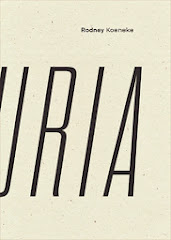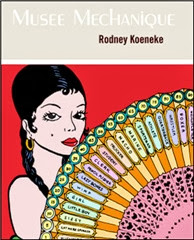
I’m feeling a little like Nada’s feeling about reportage these days; that if you don’t say something, however inadequate, time’s U-pipe gets the better of our fleeting ululations. I’ve fallen out of the habit of writing down lines at readings, so no anchor to my impression that the Kemp/Buuck reading for Tangent on Saturday was one of the best in recent memory. Kemp’s delivery was as disarming as the poems, which were “about” friendship and affection and “double consciousnesses” and coyly initialed socio-aesthetic filiations in a way that had me thinking of O’Hara for no good reason except they were so immediately pleasurable. He also managed to pack the place with students, colleagues, and well-wishers who embodied some of the interpersonal energies celebrated in the poems. Kemp’s here for the painters, but I hope he’ll do time with the poets now he’s in town.
David Buuck, a close friend of Kemp’s, kept the night rolling with a performance of “The Jhoke” section in The Shunt, a piece built from puns on the venerable “man walks into a bar” routine, which he launched by literally walking into the bar, shuffling down its edges, exiting, re-entering, draping himself on a barstool, dropping to the floor, and finally crawling his way back to the mike, keeping up all the while a stuttery patter that circled around poetry and citizenry in wartime. After that, he asked an audience member to shuffle a set of paragraphs containing sections of an autobiography centered on a relationship he had before he became a writer. I think it’s John Freccero who argues that Dante’s Commedia is the prototype for all autobiographies written since, where the person the life describes ends up converted into the author who’s currently describing it, so that the real subject of every autobiography is the progress that made possible the conditions of its own writing. Buuck’s piece cannily played off that assumption, using phrasal iterations and variations on fixed bits of syntax to tweak the usual “then I was, now I am” time sense the form usually imposes, shuttling the narrative fulcrum backwards and forwards across the sequence through a kind of architectonic horseplay designed to restrain “narrative theory” from topping “narrative practice.”
Buuck’s reading had lovers bridled like horses, and Kemp’s a rabid squid nailed to someone’s face, so the night also helped firm up my feeling that the conjunction between sex, animality, and violence is somehow the secret engine behind contemporary poetry, at least the part of it I feel like writing about in abbreviated posts like these.
 Portland’s Loggernaut Reading Series pivots on its first five years and turns to face the next with a group reading tomorrow, May 1. Congrats to Jesse Lichtenstein & Erin Ergenbright for keeping the log rolling that long.
Portland’s Loggernaut Reading Series pivots on its first five years and turns to face the next with a group reading tomorrow, May 1. Congrats to Jesse Lichtenstein & Erin Ergenbright for keeping the log rolling that long.











